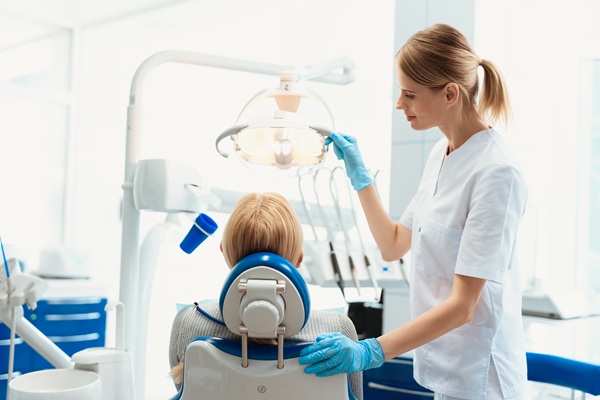How General Dentists Treat TMJ

Find out more about TMJ, a common jaw-related disorder. Visiting a general dentist allows individuals to receive a proper diagnosis, as well as understand how severe the TMJ is. Once diagnosed, treatment is the next step.
About TMJ
Understanding what TMJ is and how it can affect one’s oral health is important. Since TMJ can also affect one’s overall general health, treatment is often necessary. According to Healthline, TMJ disorders occur when something goes wrong with the jaw joints and jaw muscles. This can cause sufferers to experience minimal jaw-related complications or severe jaw-related complications. When it comes to what causes someone to be diagnosed with this disorder, arthritis, joint erosion, teeth clenching and teeth grinding are some of the more common causes.
Treating TMJ
There are a few different ways that a general dentist will treat a TMJ disorder in their patients. Since there are many different types of treatments available, it will depend on the patient's individual situation when it comes to the treatment options a dentist will offer them. Because it is possible for TMJ to worsen and/or become more severe, it is essential for anyone diagnosed with this disorder to undergo treatment from a general dentist.
The list below includes detailed information on three of the more common TMJ treatments.
#1 – Custom-made oral appliances
There are oral appliances available to help dental patients who are diagnosed with TMJ, which include bite guards and oral splints. An oral appliance is a removable dental device that works by helping to keep a patient's teeth and jaw in their proper positions, which is especially important during the night when sleeping. An oral appliance also helps TMJ patients from grinding or clenching their teeth, which is known to make certain cases of TMJ worse.
#2 – Prescribed medications
General dentists can provide their patients with anti-inflammatory medications in order to reduce any pain or swelling they experience from TMJ. This includes muscle relaxers, as many people who are diagnosed with TMJ often grind or clench their teeth, which tends to cause pain in the facial muscles. Anti-anxiety medication is also an option for some patients in order to help reduce their stress levels, which can reduce symptoms of TMJ.
#3 – Following recommended self-care practices at home
Patients who are diagnosed with a mild case of TMJ are likely to be given a sheet of self-care instructions to practice when at home. This list of instructions will be personalized for each individual patient, as every patient's case of TMJ is going to differ. Examples of self-care instructions include reducing the stress in one’s life, reducing any type of jaw movement that can exasperate the disorder, using ice to reduce any swelling, avoiding eating hard foods, avoiding chewing gum and performing certain jaw stretching exercises.
Need to make an appointment?
Need to be seen by a general dentist for TMJ reasons? Now that the above information has been read, it should be understood that there are many different treatment options that can help those suffering from TMJ-related discomfort or pain. In order for one to learn which options are going to work for them, making a dental appointment is the next step to take.
Request an appointment here: https://www.healthysmilesgeorgetown.com or call Healthy Smiles Dentistry Georgetown at (512) 864-9010 for an appointment in our Georgetown office.
Check out what others are saying about our dental services on Yelp: TMJ Dentist in Georgetown, TX.
Recent Posts
TMJ refers to the temporomandibular joint, which often dysfunctions, resulting in serious pain. Individuals that suffer from TMJ disorder often turn to their general dentist to learn more about treatment options, as well as the root cause of the disorder. Each person varies, meaning the cause of their TMJ may differ, however, there are a…
Wanting your general dentist to help you experience less TMJ pain? Some of the more common symptoms associated with temporomandibular joint disorder include a clicking of the jaw, headaches, earaches, pain when opening the mouth wide and overall tenderness in the jaw muscles. If you are experiencing even one of these symptoms, you will also…
Temporomandibular joints better-known as TMJ connect your jawbone to your skull. There is one on each side of your face. Your TMJ act as sliding hinges, allowing you to move your jaw when you speak, eat or otherwise move your mouth.A TMJ disorder occurs when one or both of these joints becomes damaged due to…
If you have TMJ disorder, Temporomandibular Joint Disorder, you may be interested in learning some tips from a TMJ dentist on how to make treatments more effective. TMJ disorders cause a wide array of uncomfortable symptoms that can be treated by a professional. There are a few basic steps to employ to make TMJ disorders…


